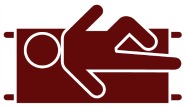 |
| full steam a head |
It is a vital part of the job we do.
There are times when it feels like bailing water with a teacup on a sinking ship.
A well designed Emergency Department will have enough nurses and doctors to handle the daily expected volumes of bellyaches and runny noses as well as the chest pains and traumas. It will also have a good triage system where a nurse puts eyes on a patient on arrival and determines whether they are sick or not sick.
Yet there are always time when you will get fooled. Patients lie -- often because they don't know the truth. They don't know the important information, or their presentation is unusual, their story is vague. The medical team goes down the wrong path -- prioritizes the labs before the head CT or vice versa.
There will always be times when a department gets overwhelmed and resources just aren't available. Things get missed or miscommunicated, computers go down. Things go wrong.
I've just been through a week of these brutal days: Of restrained psych patients tipping over their gurneys and ambulances coming through the door of our little ED two at a time. Six 12 hour shifts of waves crashing against one doc, two nurses and a tech.
On my last night, I knew I was in for another 12 hours of pounding surf.
When the day shift nurse gives you a hug because they are so glad to see you come on, you know they've had a brutal 12. It took us a while to figure out that the misery to acuity ratio was out of control. Once we sorted the drama from the trauma, we took care of the sick people first and finally got thing restored to baseline chaos.
We spent most of the night, feeling like we were underwater and no amount of swimming was going to bring us to the surface.
I could see it in dayshift's eyes as they were leaving. The next shift finally comes in to clean up the mess and you kick yourself as you go home. It is tempting to blame others, or blame yourself for what went wrong.
Yet, blame doesn't fix anything ... and doesn't make anyone feel better or work better.
When other team members make a mistake how we respond can be the determining factor in helping that person recover and get better. As author Justin Bariso writes:
"leaders are in a unique position to help individuals recover from mistakes. When a leader keeps his or her own failures in mind, it's easier to use words to encourage and build up than to dishearten and tear down. By choosing to focus on the positive, skillfully sharing your own personal experience, or simply reminding the person that everyone has a bad day, you do everything in your power to help that person recover."
Of course we need to review the breakdowns in the system to make it better, to innovate to better allocate resources if possible. When the heat of battle has died away, we need to talk to our team to discuss what could have gone better. We need to learn whether we got it right or got it wrong. That's why experience in emergency medicine is the most precious resource.
However, internalizing our mistakes can take the form of self-abuse, battering our confidence and diminishing our ability to make decisions that have to be made.
It is times like this when I find myself consoling my coworkers with a mantra I've picked up over the years.
"You can only do, what you can do."
As a human being and as a system, resources are finite. We cannot see or know everything, we cannot be everywhere at once. We must triage and prioritize our tasks, triage the demands on our minds and on our souls. We are not superhuman and we cannot bear all the burdens of the world.
Nor should we expect that of ourselves or others.


No comments:
Post a Comment